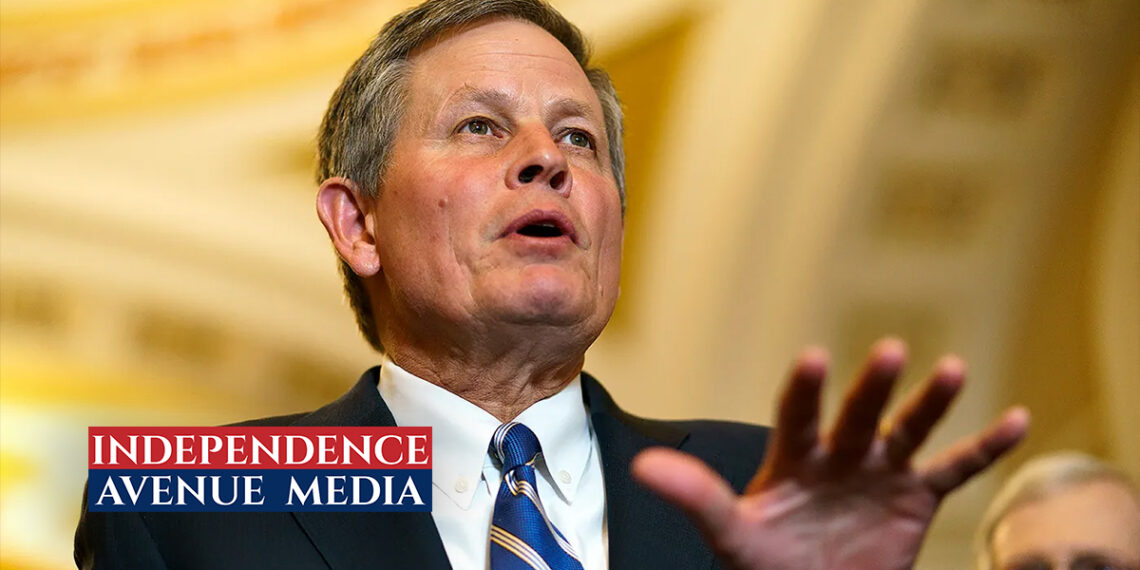“Any antagonism between our countries could end tomorrow,” Republican Senator Steve Daines of Montana recently told a conference on U.S.-Georgia relations, warning that Tbilisi is “unfortunately heading in the wrong direction” just as a new geopolitical order is taking shape in the South Caucasus.
Addressing regional experts at the Hudson Institute in late October, Daines highlighted the emerging Trump Route, a sweeping infrastructure and geopolitical initiative designed to strengthen transport and energy links between Europe and Asia while bypassing Russian, Chinese, and Iranian influence.
“Armenia and Azerbaijan have chosen to work with the United States, while Georgia has unfortunately moved in the wrong direction in recent years,” he said, urging Tbilisi to decide whether it wants to reset ties with Washington and take part in the region’s new security architecture.
“There is no reason Georgia cannot be a part of the newly emerging regional partnership and benefit the same as its very important neighbors,” he added.
“All they need to do is reach out and grasp the outstretched hand of the United States and redouble their commitment to a pluralistic democratic governance system,” said Daines, emphasizing Georgia’s “strategic role in this opening up of the corridor, certainly as the one country of the Caucasus that has direct access on the Black Sea.”
A member of the Senate Foreign Relations Committee with a focus on energy issues, Daines visited Armenia, Azerbaijan and Georgia in spring 2025, meeting with both government and opposition leaders in Tbilisi.
His comments come amid an unprecedented low in U.S.-Georgia relations. In July of last year, the U.S. froze $95 million in U.S. assistance to the Georgian government. By late November, the Biden administration suspended the U.S.-Georgia Strategic Partnership Commission, which had been in place since 2009. On December 27, the administration sanctioned Georgian Dream’s honorary chairman, billionaire businessman and former Prime Minister Bidzina Ivanishvili, “for undermining the democratic and Euro-Atlantic future of Georgia for the benefit of the Russian Federation.”
The U.S. also imposed visa restrictions on dozens of Georgian officials, including judges. In May, the U.S. House of Representatives overwhelmingly passed the bipartisan MEGOBARI Act in support of Georgia’s democratic development, though the bill remains stalled in the Senate.
- The ‘Trump Route’
On August 8, 2025, President Donald Trump, Armenian Prime Minister Nikol Pashinyan, and Azerbaijani President Ilham Aliyev signed a peace agreement at the White House. The deal not only ended the Armenia-Azerbaijan conflict but also laid the groundwork for a new transit route across the South Caucasus.
Formally known as the Trump Route for International Peace and Prosperity — or TRIPP for short — the initiative connects Azerbaijan with its Nakhchivan exclave through Armenia under U.S. private-sector management and security guarantees for the next 99 years.
The project includes railways, highways, oil and gas pipelines, and digital infrastructure, with the goal of reinforcing strategic connections between Europe and Asia while sidestepping Moscow, Beijing, and Tehran. Some analysts have described the agreement as a major setback for Russia, weakening its regional influence while elevating America’s role in shaping transit and energy networks.
At the Hudson Institute discussion, experts stressed that the new route is more than an energy project but a rethinking of regional security. The South Caucasus, some of them argued, is set to become a central link connecting U.S. strategy on the Black Sea, Central Asia, and Europe’s energy security.
In Tbilisi, the Trump Route has been welcomed by the Georgian government as a regional success story.
Prime Minister Irakli Kobakhidze congratulated Armenia, Azerbaijan, and “the entire international community,” calling the deal “a step toward peace and stronger connectivity.”
Opposition figures, however, argue that Georgia should have been an active participant — not merely a bystander applauding others’ achievements.
Analysts share those concerns. The Jamestown Foundation noted that Kobakhidze’s overly celebratory tone “renders Georgia an isolated country, alongside Russia and Iran,” highlighting how Tbilisi’s cautious diplomacy risks leaving it outside the region’s new geopolitical order.
Experts warn that if trade and transit links increasingly develop through Armenia and Azerbaijan, “Georgian railways, roads, and Black Sea ports may experience a significant decline in cargo flows.”
They say this risk is compounded by Georgia’s growing distance from Western partners — a trend that could gradually erode its role as the South Caucasus’ key transit hub.
- Can the South Caucasus Move Forward Without Georgia?
Georgia’s access to the Black Sea makes it critical for regional trade and infrastructure projects. But as relations between Tbilisi and Western capitals deteriorate, some analysts warn the country risks being left behind at a historic moment.
“We should not forget that there is another occupation taking place in the South Caucasus, in Georgia, where Russian authorities occupied 20% of Georgia’s internationally recognized borders,” said Luke Coffey, a senior fellow at the Hudson Institute. “I suspect, as we’ve been seeing with recent events in Georgia, as Russian influence gets slightly pushed out of Armenia and Azerbaijan, there’s going to be more focus on what’s happening in Georgia.”
According to Senator Daines, the Trump Route ushers the South Caucasus into a new geopolitical reality. Whether Georgia shares in its benefits, he said, will depend entirely on the choices made in Tbilisi.


